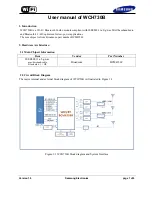
19
DHCP IP Address Range
These two values (
from
and
to
) define a range of addresses that the DHCP Server uses when
assigning addresses to computers and devices on your Local Area Network. Any addresses
that are outside of this range are not managed by the DHCP Server; these could, therefore, be
used for manually configured devices or devices that cannot use DHCP to obtain network
address details automatically.
It is possible for a computer or device that is manually configured to have an address that does
reside within this range. In this case the address should be reserved (see
Static DHCP Client
below), so that the DHCP Server knows that this specific address can only be used by a
specific computer or device.
Your Wireless router, by default, has a static IP address of 192.168.0.1. This means that
addresses 192.168.0.2 to 192.168.0.254 (from 2 to 254) can be made available for allocation
by the DHCP Server.
Example:
Your Wireless router uses 192.168.0.1 for the IP address. You've assigned a computer that you
want to designate as a Web server with a static IP address of 192.168.0.3. You've assigned
another computer that you want to designate as an FTP server with a static IP address of
192.168.0.4. Therefore the starting IP address for your DHCP IP address range needs to be 5
or greater.
Example:
Suppose you configure the DHCP Server to manage addresses From 100 To 199. This means
that 3 to 99 and 200 to 254 are NOT managed by the DHCP Server. Computers or devices that
use addresses from these ranges are to be manually configured. Suppose you have a web
server computer that has a manually configured address of 192.168.0.100. Because this falls
within the "managed range" be sure to create a reservation for this address and match it to the
relevant computer (see
Static DHCP Client
below).
DHCP Lease Time
The amount of time that a computer may have an IP address before it is required to renew the
lease. The lease functions just as a lease on an apartment would. The initial lease designates
the amount of time before the lease expires. If the tenant wishes to retain the address when
the lease is expired then a new lease is established. If the lease expires and the address is no
longer needed than another tenant may use the address.
Always Broadcast
If all the computers on the LAN successfully obtain their IP addresses from the router's DHCP
server as expected, this option can remain disabled. However, if one of the computers on the
LAN fails to obtain an IP address from the router's DHCP server, it may have an old DHCP
client that incorrectly turns off the broadcast flag of DHCP packets. Enabling this option will
cause the router to always broadcast its responses to all clients, thereby working around the
problem, at the cost of increased broadcast traffic on the LAN.
Number of Dynamic DHCP Clients
In this section you can see what LAN devices are currently leasing IP addresses.
Revoke:
The
Revoke
option is available for the situation in which the lease table becomes full
















































